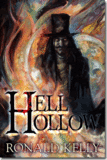 Cemetery Dance / November 2009
Cemetery Dance / November 2009
Reviewed by: Blu Gilliand
Ronald Kelly’s Hell Hollow is the bastard son of Robert McCammon’s Boy’s Life and Wes Craven’s original A Nightmare on Elm Street, a quick-moving mashup of the classic coming-of-age, fish-out-of-water story and old-fashioned supernatural terror tale.
Keith Bishop is a spoiled boy living in Atlanta, a latch-key kid whose parents can’t tear their eyes away from the next rung of the corporate ladder long enough to discipline their son. Events conspire to sentence Keith to a month-long stay with his seldom-seen grandfather, Jasper McLeod, in the tiny Tennessee town of Harmony. Harmony is the quintessential small Southern town, populated with hard-working farm families, deep woods, pastures, and, of course, a run-down general store. In other words, it’s the last place a city boy wants to be.
Keith reluctantly falls in with a group of friends that include his cousin Rusty, crush-worth Maggie, and wheelchair-bound Chuck. When Keith wins a bet that forces his new acquaintances to help him explore a mysterious section of the woods known around Harmony as Hell Hollow, the foursome find themselves face-to-face with the evil that has been hidden there for nearly a hundred years – an evil that has begun to stir again.
Few can bring a Southern summer to life the way Ronald Kelly does in Hell Hollow. He perfectly captures not only the essence of a hot August day, but also what it’s like to be young, free, and restless on such days. Endless bicycle rides, swimming in a cold creek, sneaking a juicy watermelon from a neighbor’s field – it’s all vividly portrayed. Kelly also perfectly captures the dark undercurrent that runs through the town. Flashbacks tell the story of what’s in the Hollow and why it’s been dormant for so long, as well as revealing its connection to newcomer Keith.
Hell Hollow clocks in at nearly 500 pages, but it’s no slog – Kelly’s prose is lean and precise, the mark of an author steeped in the tradition of oral storytelling. He manages to paint vivid pictures with spare strokes, something any writer will tell you is no easy feat.
There are a couple of stumbling blocks along the way. A side plot involving a hitchhiking serial killer named Slash and one of his intended victims feels shoehorned in, which is problematic considering how big a role the characters play in the overall story. Kelly loses his footing a bit when he takes the story out of Harmony and into the children’s dreams – he just doesn’t quite capture the landscapes there the way he does those of Tennessee. And toward the end of the book, the villain lapses into some unfortunate Scooby-Doo bad guy dialogue of the “meddling kids” variety.
However, in the grand scheme of the story, these are minor distractions. The first two-thirds of the book are marvelous, and the downshift in quality of the last third is slight enough that it doesn’t damage the experience as a whole. If you’re from the South, much of this book is going to ring absolutely true for you. If you’re not, then come along and see what you missed.
Purchase Hell Hollow by Ronald Kelly.